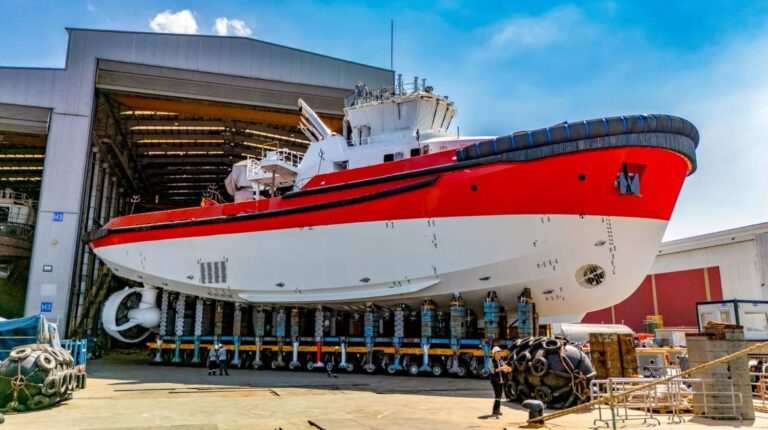Sanmar Shipyards has launched the first of two purpose-built dual-fuel methanol escort tugs it is building for Kotug Canada.
Based on the RAsalvor 4400-DFM design from Canadian naval architects Robert Allan, the two new tugs – the first Sanmar has built for Kotug Canada – will service Canada’s Trans Mountain Expansion Project (TMEP), escorting tankers from the harbor limits of the Port of Vancouver to the open Pacific Ocean.
They will become the most powerful escort tugs in Canada, capable of achieving a massive 120 tons of bollard pull, while also reducing greenhouse gas emissions and underwater radiated noise.
The methanol-fueled tugs are 44m in length, and will operate in some of the harshest environments in the world and have been customized to meet the demanding operational and environmental requirements of the project.
Along with escort work, RAsalvor 4400-DFM tugs are designed to provide long-range towing, anchor handling, rescue, and salvage. They are also equipped with firefighting equipment.
“The launch of this radically new tug, the first of twins, is an important day for the whole tug industry,” said Ali Gürün, Sanmar vice chairman and CEO. “It marks a major step forward in the use of alternative fuels to protect our planet. These are among the most powerful tugs ever built, yet have environmental protection at their heart. At Sanmar we are proud to be leading the way to an environmentally friendly future.”
“The launch of the world’s first dual-fuel methanol escort tug is more than a milestone for Kotug Canada – it is a defining moment for the maritime industry,” added Ard-Jan Kooren, president and CEO of Kotug International. “These powerful vessels prove that sustainability and performance can go hand in hand. By investing in clean technologies today, we are shaping the future of towage and paving the way for the industry to follow.”
Sanmar has taken a strategic decision to be at the forefront of the tug and towing industry’s move to a new generation of low- and zero-emission tugs, based on advanced technology and alternative fuels. Nine of its all-electric, emissions-free ElectRA harbor tugs now operate in Europe, North and Latin America.



